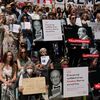Exiled writers reflect on freedom of speech in America in light of Rushdie attack

Author Salman Rushdie poses for photographers at a signing for his book Home, in London on June 6, 2017.
Grant Pollard/Invision/AP
hide caption
toggle caption
Grant Pollard/Invision/AP

Author Salman Rushdie poses for photographers at a signing for his book Home, in London on June 6, 2017.
Grant Pollard/Invision/AP
For dissident writers fleeing persecution overseas, the United States has long been a safe haven, a place where freedom of expression is tolerated and, even, valued.

That suddenly changed earlier this month, with the brutal attack on author Salman Rushdie at a speaking event in western New York.

“Oh my God! When I heard that, I was screaming,” said Masih Alinejad, a writer and activist who has criticized the Iranian government. “I was just running corner to corner in my safe house and shouting and just calling my husband, ‘I cannot believe this is happening in America, in New York.”
While literary writers in the U.S. increasingly face online threats, they rarely metastasize into actual physical attacks, said Karin Deutsche Karlekar, who directs the Writers at Risk program at PEN America. Authors routinely make public appearances with little or no security.
Such was the case with Rushdie. The India-born writer became the target of a Fatwa by Iran’s Ayatollah Khomeini in the late 1980s, over his depiction of the Prophet Muhammed in his book The Satanic Verses, and was forced into hiding.
He ultimately emerged and moved to New York. Over time, he began making personal appearances and, in the process, turned into an eloquent proponent of the right to free speech.
“Many of us who joined this field grew up being sort of galvanized by his case and what had happened to him,” Karlekar said. “And in the decades, since he has really been this sort of stalwart defender of free expression for other writers at risk.”
By this year, the dangers he faced appeared to have faded. Then, on Aug. 12, as Rushdie was about to begin a lecture at the Chautauqua Institution, a man rushed the stage and stabbed him repeatedly. The 75-year-old writer was severely injured but is expected to survive.
Police arrested 24-year-old Hadi Matar of Fairview, New Jersey, who is said to have pro-Iran sympathies.
The viciousness of the attack is forcing speaking venues that regularly host writers to rethink their security procedures, according to an official of one organization that often sponsors lectures.
But “unless you want to make every event like going to the airport,” it’s difficult if not impossible to completely eliminate risk, said the official, who was not authorized to speak publicly.
As a result, dissident writers who had come to feel safe in the United States are questioning that assumption.
Osama Alomar, a Syrian poet who has criticized his government and was forced to flee into exile, lives in a house sponsored by a U.S. human-rights group, where he has felt safe. After the Rushdie attack, he’s not as sure.


“I used to say it when I was in Syria that I’m worried about freedom of speech in Syria. Now I’m worried about that even here in America,” he said.
For journalist and activist Alinejad, an outspoken critic of Sharia law, the attack follows several incidents in which her safety was threatened. Last year, the FBI said it had foiled a plot by Iranian intelligence officers to kidnap Alinejad at her Brooklyn home. On July 28, a man was arrested carrying an AK-47 assault rifle outside her home.
Then came the attack on Rushdie, whom she has come to admire.
“To be honest, Salman Rushdie changed my life,” she said. As a teenager in Iran, she was furious at the writer, because she was “brainwashed” by government propaganda, she said.
“But when I started doing my own research about him, I was like, ‘This is unbelievable. This is what I believe now, that I have to speak out,'” she said.
While the threats against her have made her feel “miserable,” she is resolved to keep writing and speaking out against tyranny.
Her dream now is to one day appear at the Chautauqua Institution, on the same stage where Rushdie was so viciously attacked this month.
For all the latest Entertainment News Click Here
For the latest news and updates, follow us on Google News.
